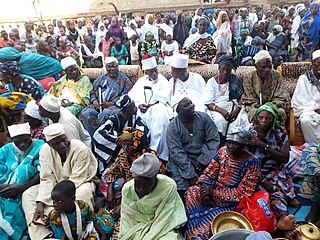 | |
| Total population | |
|---|---|
| c. 1.4 million[citation needed] | |
| Regions with significant populations | |
| 687,300 (2010)[1] | |
| 400,000 (2016)[citation needed] | |
| Languages | |
| Religion | |
| Primarily Islam, with a minority practicing traditional African religion | |
| Related ethnic groups | |
| Gur: Dagomba, Gurma, Gurunsi, Mossi, Somba, Yoruba, Nupe, Dendi and others | |
The Bariba people, self designation Baatonu (plural Baatombu), are the principal inhabitants of Borgou and Alibori Departments, Benin, and cofounders of the Borgu kingdom of what is now northeast Benin and west-central Nigeria. In Nigeria, they are found spread between western Kwara State and the Borgu section of Niger State. There are perhaps a million Bariba, 70% of them in Benin, where they are the fourth largest ethnic group and comprise approximately 1/11 of the population (9.2%).[2]
The Bariba are concentrated primarily in the north-east of the country, especially around the city of Nikki, which is considered the traditional Bariba capital.[3] At the end of the 18th century (1782), they became independent from the Yoruba of Oyo and formed several kingdoms in the Borgou region.[4] The colonization of Benin (then Dahomey) by the French at the end of the 19th century, and the imposition of an Anglo-French artificial border, ended Bariba trade in the region.
One of their noted festivals is the annual Gani festival of which horse riding is a prominent element.[3]
The Bariba people hold an important place in the history of the country. During the late 19th century, Bariba[clarification needed]was known to constitute independent states[clarification needed]and dominate with kingdoms[clarification needed]in cities like Nikki and Kandi in the northeast of the country. In the town of Pehunko, there are approximately 200,000 Bariba people out of 365,000 inhabitants.[5]
Agriculture is the dominant occupation for the Bariba. They grow corn, sorghum, rice, cotton, cassava (tapioca), yams, beans, palm oil, peanuts and some poultry and livestock.[6] Religion plays an important role in the Bariba tribe and they are primarily Islamic. However, a number of Bariba communities have their own indigenous beliefs.[6]
- ^ [1] "National statistical institute of Benin: 7.9% of a Projected 2017 Beninois population of 8.7 Million belonging to Bariba speaking groups" (2010 estimate)
- ^ Encyclopædia Britannica
- ^ a b Butler, Stuart (2006). Benin. Bradt Travel Guides, The Globe Pequot Press, Guilford, Connecticut. p. 21.
- ^ Houngnikpo, Mathurin C.; Decalo, Samuel (2013). Historical Dictionary of Benin. Rowman & Littlefield. p. 74. ISBN 978-0-8108-7171-7. Retrieved 6 May 2024.
- ^ Asante, Molefi Kete; Mazama, Ama (2009). Encyclopedia of African Religion. SAGE. p. 107. ISBN 978-1-4129-3636-1. Retrieved 6 May 2024.
- ^ a b Sargent, Carolyn Fishel (1982). The Cultural Context of Therapeutic Choice. D. Reidel Publishing Company, Netherlands.